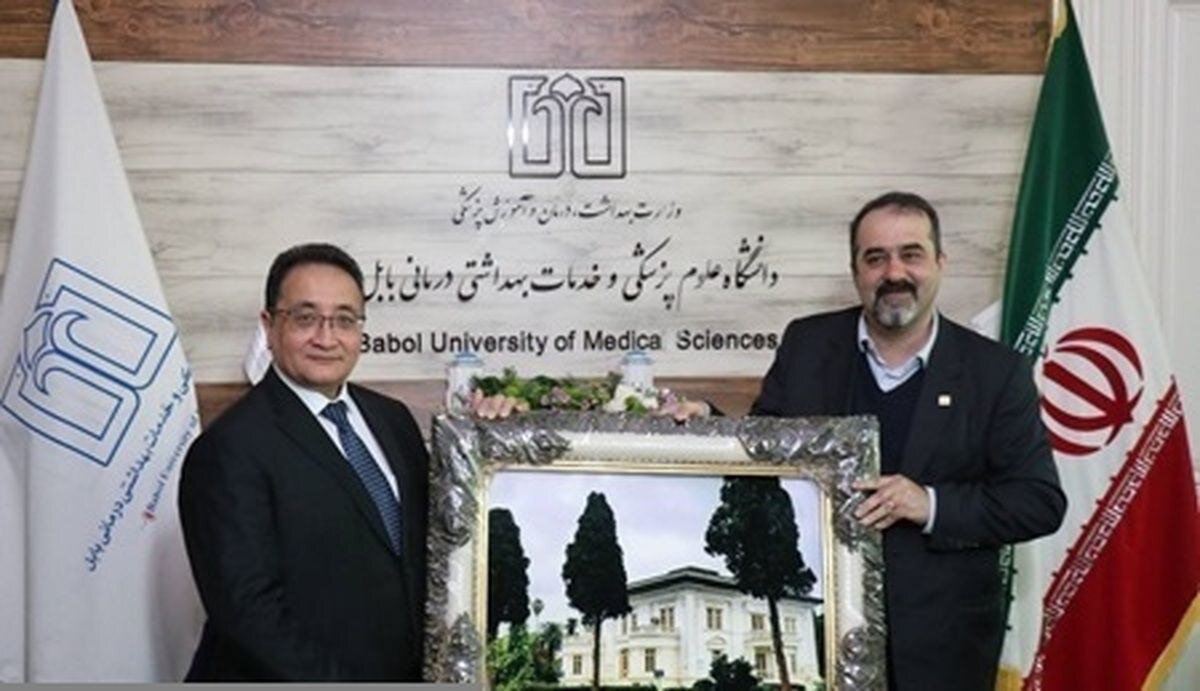Kazakhstan interested in expanding medical ties with Iran

TEHRAN –The high capabilities of Babol University of Medical Sciences in the health and tourism sectors have made Kazakhstan interested in cooperation with the university, Yerbol Akhmetov, Kazakhstan’s consul general in Gorgan has said.
The official made the remarks on Sunday, in a meeting with Hossein Qorbani, the chancellor of Babol University of Medical Sciences, Mazandaran province, the health ministry’s website reported.
During the meeting, the officials conferred on fostering ties. Dispatching skilled physicians to Kazakhstan, attracting Kazakh students, treating Kazakh patients, holding short-term educational courses, conducting joint research projects, and enhancing scientific, and educational interactions were among the main focuses of the meeting.
The officials also highlighted exchanging students and professors, organizing scientific conferences, as well as providing sabbatical leaves for students and staff.
“Since the collaboration will encompass cultural, political, social, business, science, and technology sectors besides medical ties, a memorandum of understanding will be signed to follow up on reached agreements more seriously,” Akhmetov added.
Qorbani, for his part, expressed Babol Medical University’s readiness for cooperation with Kazakhstan, highlighting the capabilities of hospitals affiliated with the university in kidney transplant, bone marrow transplant, cochlear implantation, infertility treatment, genetics, dialysis, joint replacement surgery, radiation oncology, and dentistry.
He went on to suggest establishing a working group of experts to assess the current capacities as well as future needs.
Enhancing medical ties
On December 16, the Kazakh ambassador to Tehran, Ontalap Onalbayev, expressed his country’s interest in expanding cooperation with Iran in the fields of medicine, medical education, and treatment.
Lauding Iran’s high capacity in the health sector including high-tech medical tools, highly qualified doctors, as well as lower cost of treatment compared to other countries, the official highlighted boosting collaborations in different health fields such as health tourism, and medical education, ISNA reported.
The Kazakh ambassador made the remarks during a meeting with Mohammad-Sadeq Rezaei, the chancellor of Mazandaran University of Medical Sciences, on Sunday in Sari, the capital of Mazandaran province.
“Caspian littoral states should foster joint activities in various fields like economy, and medical sciences,” he stated.
Referring to the close relationship between the two countries, the official said Kazakhstan’s president highly values health and medical treatment. He also voiced his country’s readiness to establish a branch of Mazandaran University of Medical Sciences in Kazakhstan.
Rezaei, for his part, welcomed the idea of expanding ties in medical education by announcing the university’s readiness to admit Kazakh students.
He went on to stress the high potentials of the university such as international professors, over 600 faculty members, and several hospitals that provide health services in dermatology, and cancer treatment, as well as heart and brain surgeries to international patients.
Referring to health tourism, he underscored Mazandaran’s pristine nature, up-to-date facilities, and affordable costs of treatment which also provide a great opportunity for patients from Eurasian countries, including Kazakhstan, to pass their convalescence phase.
The officials agreed to prepare a draft of a memorandum of understanding to follow up on the made agreements.
Medical tourism
Iran has the potential to generate €6 billion annually from medical tourism with proper planning, according to Mohammad-Reza Vaez-Mahdavi, Chairman of Iran’s Scientific Association of Health Economy.
Currently, the country’s annual revenue from health tourism stands at €700 million, TABNAK reported.
Mahdavi highlighted Iran’s goal to become a healthcare hub for West Asia in the coming years, which includes plans to export €1 billion worth of vaccines and medical equipment annually.
Iran’s current annual exports of medicine amount to €200 million, but Mahdavi believes this figure can easily be scaled up to €1 billion with the right infrastructure and market strategies.
Mahdavi also pointed out the need for better support systems and confidence-building measures for foreign medical tourists.
MT/MG
Leave a Comment